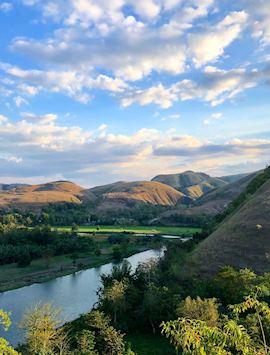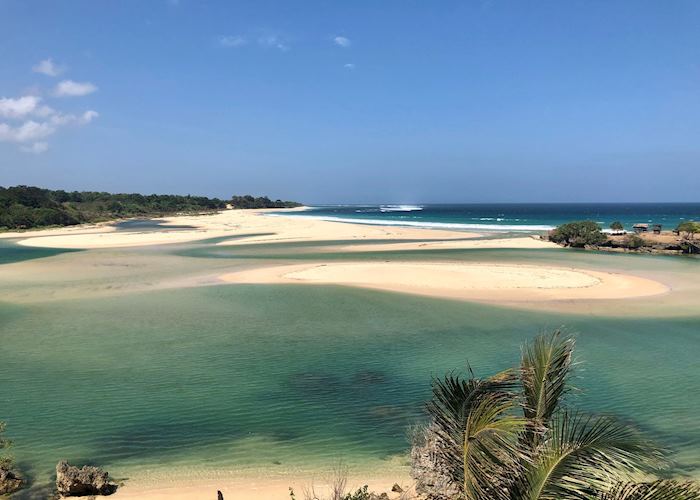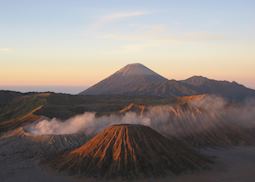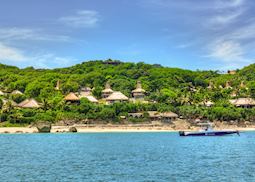Jump to:
The island of Sumba is rarely visited by foreign tourists although there has been a steady increase in the last 20 years.
The initial attraction has been the beautiful local ikat cloth but more recently it has become famous for its diving and secluded beaches. It is an easy two-hour flight from Denpasar on Bali and the island offers tranquillity and white sandy beaches, so this is the ideal place to head for if you are looking for traditional tribal culture mixed with a relaxing beach stay.
Geology
Along with Timor, Sumba is part of the southern arc of islands in Nusa Tenggara that were formed by raised coral reefs, limestone and sedimentary rock, unlike the volcanic origins of Lombok, Sumbawa, Komodo and Flores. There is also strong evidence to suggest that Sumba may in fact be an island fragment torn off northern Australia.
Eastern Sumba
The east Sumbanese are largely dependent on the export of cattle, water buffalo and the famed Sumbanese horse. It is also home to the island's most stunning ikat and is often shipped to Bali to be sold around Kuta, although the best is normally kept on the island to be used in burials and ceremonies. Few traditional houses remain and virtually the last of the old tombs at Melolo are in a poor state. The region is however home to possibly Sumba's oldest village, Prailiang, and the small collection of traditional homes are certainly located in one of the most stunning settings on the island. There are no hotels of note on this side of Sumba but as many of the flights arrive or depart in Waingapu people will often spend a short while in this region.
Western Sumba
Western Sumba receives significantly more rainfall than the arid east and as a result is home to about two thirds of the island's population. For people visiting Sumba this district certainly has the most to offer, with long stretches of perfect white sand beaches, excellent diving and surfing opportunities and the best preserved traditions of the islanders animist beliefs. Ancient tombs, high priests, ceremonies and sacrifices are all a part of life here. We can arrange trips to the most important tombs and villages for you, but some of the best occasions are the ceremonies and rituals that you may visit and because these are never planned more than a few days in advance you will only hear about them through your guide or hotel.
who's been there
-
01993 838 92501993 838 110
- Make an enquiry
Suggested itinerary featuring Sumba
This sample itinerary will give you an idea of what is possible when you travel in Sumba, and showcases routes we know work particularly well. Treat this as inspiration, because your trip will be created uniquely by one of our specialists.
Places in and around Sumba
- Pantai Marosi Sumba
- Pantai Nihiwatu Sumba
- Tambolaka Sumba
- Komodo Island 95 miles away
- Flores 108 miles away
- Moyo Island 205 miles away
- Mount Rinjani 267 miles away
- Lombok 268 miles away
- Medana Bay 289 miles away
- Senggigi 291 miles away
- Sire Beach 291 miles away
- The Gili Islands 294 miles away
Photos of Sumba
Our expert guides to exploring Sumba
Written by our specialists from their own experiences of visiting Sumba, these guides will help you make the most of your time there. We share both our practical recommendations and the best ways to appreciate Sumba at its best.
-
What to do in Indonesia: our highlights guide ![Sunrise over Mount Bromo, Indonesia]()
What to do in Indonesia: our highlights guide
What to do in Indonesia: our highlights guide
Active volcanoes, exotic wildlife and outstanding beaches; the Indonesian archipelago has so much to offer. Spend time with the Taroja people and discover their traditions or explore the many Buddhist temples.
Read this guide
Accommodation choices for Sumba
We've selected a range of accommodation options for when you visit Sumba. Our choices usually come recommended for their character, facilities and service or location. Our specialists always aim to suggest properties that match your preferences.
-
![Guest room, Cap Karoso]()
Cap Karoso
Sumba -
![Nihiwatu Resort, Pantai Nihiwatu]() Responsible ChoiceWe've hand-selected a range of tours and stays across the world that go above and beyond to be a force for good by supporting local businesses, educating staff, challenging local norms, or promoting conservation and biodiversity efforts. Your Responsible Choice helps increase the positive impact of your trip.
Responsible ChoiceWe've hand-selected a range of tours and stays across the world that go above and beyond to be a force for good by supporting local businesses, educating staff, challenging local norms, or promoting conservation and biodiversity efforts. Your Responsible Choice helps increase the positive impact of your trip.NIHI Sumba Island
Sumba









